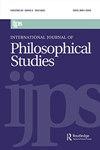隐修会:梅的“新定义”
IF 0.6
3区 哲学
0 PHILOSOPHY
INTERNATIONAL JOURNAL OF PHILOSOPHICAL STUDIES
Pub Date : 2022-08-08
DOI:10.1080/09672559.2022.2108102
引用次数: 0
摘要
摘要尽管这些年来,梅洛-庞蒂的作品引发了大量争论,但他的现象学是否提供了他所宣称的“先验的新定义”,仍然是一个悬而未决的问题。在本文中,我通过澄清他对先验的承诺来支持他的主张,反对自然主义和康德主义这两种主流的解释。我认为,梅洛-庞蒂认为科学本身依赖于韦森肖的先验方法,这确立了他对先验性的基本承诺。同时,梅洛-庞蒂对先验的处理在重要方面与康德的先验及其先验唯心主义分支不同,因为在他看来,主体不是宪法的唯一基础。在克服了理解梅洛-庞蒂对先验的承诺的这些障碍后,我根据他的“激进反思”概念认为,先验不是经验的静态元素,而是与后验形成动态关系,作为表达生活经验结构的独特方式。本文章由计算机程序翻译,如有差异,请以英文原文为准。
The A Priori: Merleau-Ponty’s ‘New Definition’
ABSTRACT Despite the significant amount of debate that Merleau-Ponty’s work has seen over the years, it remains an unresolved issue whether his phenomenology offers what he announces as a ‘new definition of the a priori’. In this paper, I make a case in favor of his claim by clarifying his commitments to the a priori against two dominant lines of interpretation, naturalist and Kantian. I argue that Merleau-Ponty’s view that the sciences themselves rely on the a priori method of Wesensschau establishes his basic commitment to apriority. At the same time, Merleau-Ponty’s treatment of the a priori differs in important respects from the Kantian a priori and its transcendental idealist ramifications because, on his view, the subject is not the unique ground of constitution. Having tackled these obstacles to understanding Merleau-Ponty’s commitments to the a priori, I argue in light of his conception of ‘radical reflection’ that rather than being a static element of experience, the a priori stands in a dynamic relation with the a posteriori as a distinctive way of articulating structures of lived experience.
求助全文
通过发布文献求助,成功后即可免费获取论文全文。
去求助
来源期刊

INTERNATIONAL JOURNAL OF PHILOSOPHICAL STUDIES
PHILOSOPHY-
CiteScore
0.90
自引率
0.00%
发文量
29
期刊介绍:
The International Journal of Philosophical Studies (IJPS) publishes academic articles of the highest quality from both analytic and continental traditions and provides a forum for publishing on a broader range of issues than is currently available in philosophical journals. IJPS also publishes annual special issues devoted to key thematic areas or to critical engagements with contemporary philosophers of note. Through its Discussion section, it provides a lively forum for exchange of ideas and encourages dialogue and mutual comprehension across all philosophical traditions. The journal also contains an extensive book review section, including occasional book symposia. It also provides Critical Notices which review major books or themes in depth.
 求助内容:
求助内容: 应助结果提醒方式:
应助结果提醒方式:


